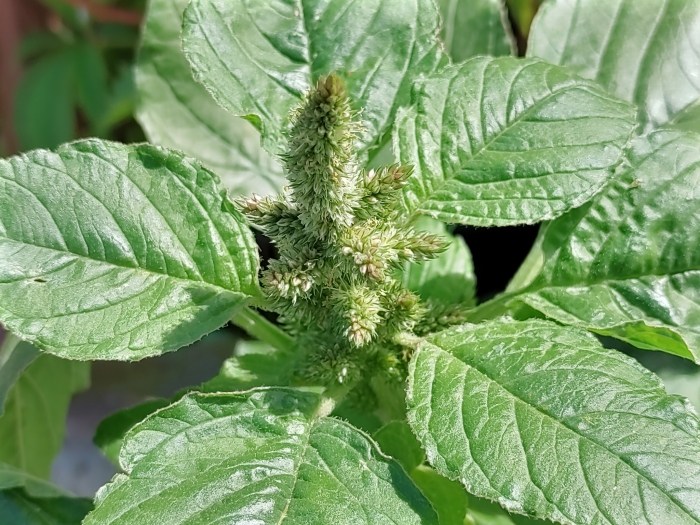Redroot Pigweed
(Amaranthus retroflexus)
Redroot Pigweed (Amaranthus retroflexus)
/
/

© aga_l_
CC BY 4.0
Image By:
© aga_l_
Recorded By:
Copyright:
CC BY 4.0
Copyright Notice:
Photo by: © aga_l_ | License Type: CC BY 4.0 | License URL: http://creativecommons.org/licenses/by/4.0/ | Uploader: aga_l_ | Publisher: iNaturalist |


















Estimated Native Range
Summary
Amaranthus retroflexus, commonly known as redroot pigweed, is an annual herb that is originally native to tropical and temperate regions of the Americas, including the Neotropics and North America. It has since become widespread globally. This plant can reach up to 10 feet in height and is characterized by its erect, stout stems, and lance-shaped leaves that are often tinged with red or purple. The dense clusters of small greenish flowers appear in summer and are followed by the production of tiny, shiny black seeds. Redroot pigweed is named for its distinctive red taproot.
Redroot pigweed thrives in disturbed soils and is often found in agricultural fields, gardens, and waste areas, making it a common weed in these environments. It is highly adaptable, growing in a variety of soil types, but prefers full sun and can tolerate drought conditions. In cultivation, it can be used as a leafy vegetable, with young leaves harvested for consumption, although it is not commonly grown for this purpose due to its invasive nature. Gardeners should be cautious, as it can become aggressive and outcompete other plants. It is also known to host pests like the beet leafhopper, which can transmit plant viruses.CC BY-SA 4.0
Redroot pigweed thrives in disturbed soils and is often found in agricultural fields, gardens, and waste areas, making it a common weed in these environments. It is highly adaptable, growing in a variety of soil types, but prefers full sun and can tolerate drought conditions. In cultivation, it can be used as a leafy vegetable, with young leaves harvested for consumption, although it is not commonly grown for this purpose due to its invasive nature. Gardeners should be cautious, as it can become aggressive and outcompete other plants. It is also known to host pests like the beet leafhopper, which can transmit plant viruses.CC BY-SA 4.0
Plant Description
- Plant Type: Herb
- Height: 0.5-2.5 feet
- Width: 1.75-3.25 feet
- Growth Rate: Rapid
- Flower Color: Green
- Flowering Season: Spring, Summer, Fall
- Leaf Retention:
Growth Requirements
- Sun: Full Sun
- Water: Medium
- Drainage: Medium
Common Uses
Bird Garden, Butterfly Garden, Edible*Disclaimer: Easyscape's listed plant edibility is for informational use. Always verify the safety and proper identification of any plant before consumption., Low Maintenance
Natural Habitat
Originally native to tropical and temperate regions of the Americas
Other Names
Common Names: Redroot Pigweed, Green Amaranth, Careless Weed, Common Amaranth, Pigweed Redroot
Scientific Names: , Amaranthus retroflexus, Amaranthus bulgaricus, Amaranthus bullatus, Amaranthus bullatus, Amaranthus chlorostachys, Amaranthus curvifolius, Amaranthus delilei, Amaranthus dubius, Amaranthus johnstonii
GBIF Accepted Name: